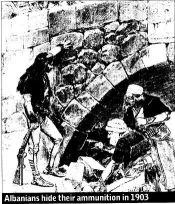 The Balkans 1804-1999
The Balkans 1804-1999Misha Glenny
Granta £25
Reviews, Socialist Review, No.237, January 2000.
Copyright © Socialist Review.
Copied with thanks from the Socialist Review Archive at http://www.lpi.org.uk.
Marked up by Einde O’Callaghan for the Marxists’ Internet Archive.
 The Balkans 1804-1999
The Balkans 1804-1999
Misha Glenny
Granta £25
Much of the left internationally responded to the wars and civil wars in the Balkans in the 1990s very much like a hill walker without a map – going round in circles, getting stuck in bogs, marching proudly off in the wrong direction. What they lacked, of course, was not a map of the physical landscape of the Balkans, but a historical and political map showing the interplay of developing class formations, ethnic groupings, national states and Great Power interests. Confused by the lack of such a map, some even threw away the compass and came to believe that north was south, that imperialist bodies like the Pentagon, the State Department, the CIA and Nato had humanitarian motives.
Those of us who tried to avoid such traps had to rely on partial maps. We turned to histories of particular states or ethnic groups; but these were invariably distorted by degrees of romantic identification with one or other of the region’s nationalisms. We also turned to very old but still very useful maps – Trotsky’s journalistic writings on the Balkan Wars of 1912-13. But none of these were a substitute for an overall view of the history and politics of the region.
This Misha Glenny has now attempted to provide. In doing so he has performed a service for anyone who wants to get a deeper view of the problems of the region – and of Great Power intervention in the region – than you will ever get from the tabloid-style articles that fill allegedly serious liberal papers like the Guardian and the Observer.
Three great conclusions emerge from the book. The first is that the peoples of the Balkans are not innately warlike, savage or inhuman. War and civil wars have not been a continual feature of the region over the last 200 years, and when they have occurred it has been for concrete historical reasons. Glenny does not, perhaps, spell this out sufficiently, but he implies that the most important reason has been the fragmented development of rival bourgeoisies. Each has set out to copy the bourgeoisies of western Europe in establishing nation states, but none has been able to do so without vicious clashes with the others and reliance upon Great Power intervention.
The second is that such Great Power interventions have always been motivated by crude calculations of economic and strategic advantage – they have been imperialist in the strict meaning of the term. Glenny describes, for instance, the crude reasoning behind their carving up of the region at the Treaty of Berlin in 1878 and the Yalta Conference of 1945.
Finally, he shows how disastrous the effects of their interventions have always been – whether it was a question of extracting debt repayments and selling arms in the years between 1878 and 1913, or attempts to take advantage of the collapse of Yugoslavia in 1990-91.
There are a few faults with the book. At times it rushes through the history of particular countries at a bewildering pace. There are some small factual mistakes. It often does not spell out sufficiently what an emerging nationalism meant for the mass of ordinary people who accepted it. Above all, it skates over those all-important occasions when social movements emerged which led people to identify themselves in class rather than ethnic terms, and there is little understanding of the impact of the Russian Revolution of 1917.
But despite these problems this is a book we could all have done with during the horrific days last spring when bombers from Oxfordshire were pummelling Belgrade. And it will be just as indispensable if, as Glenny suggests is likely, a further horrific war erupts in the region.
Last updated on 22 December 2009